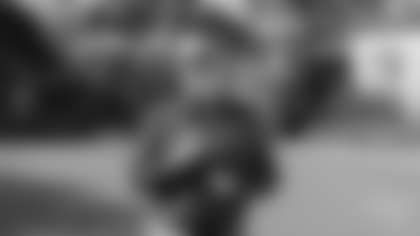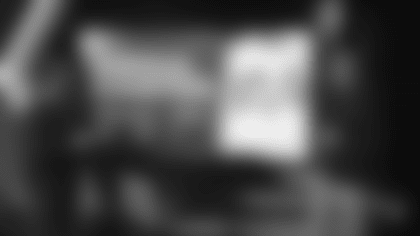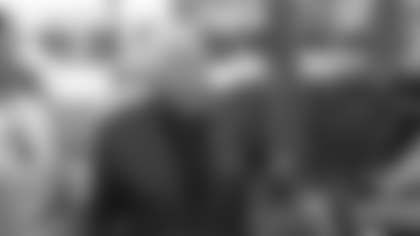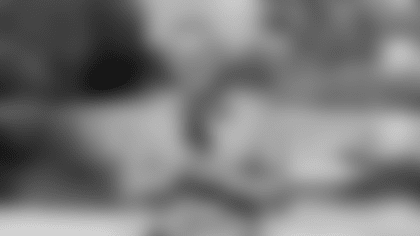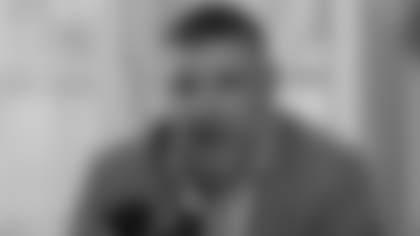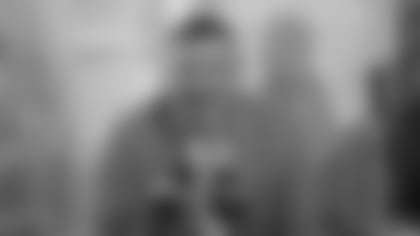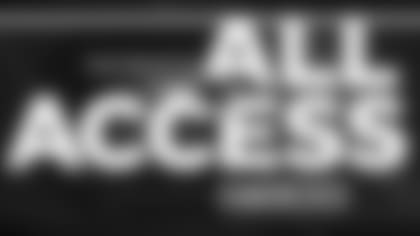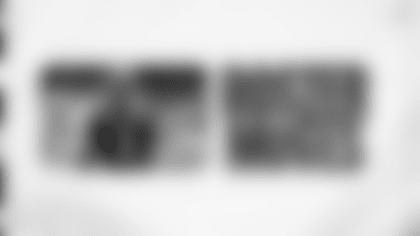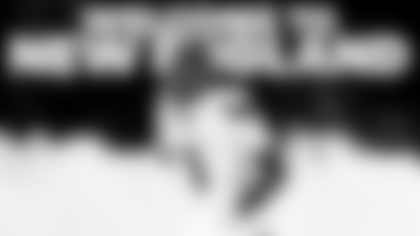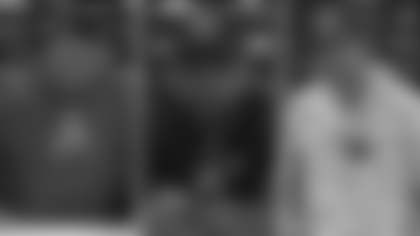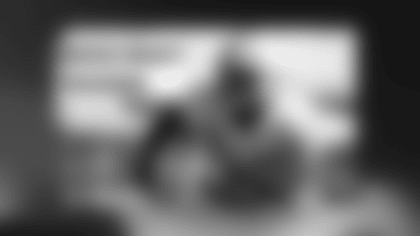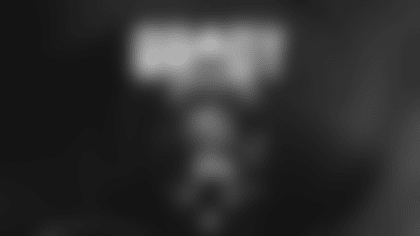DIRECTOR OF PLAYER PERSONNEL NICK CASERIO
VIDEO PRESS CONFERENCE
April 24, 2020
NC: Good morning again. Thanks for being here. This is actually a lot easier than walking down the hallway. Probably easier to do your stories. Obviously a pretty busy, busy day, pretty active. We talked about it last night. I think the expectation was there probably would be some degree of movement here today. You never really know what the movement is going to entail, but we started the day with five picks, we ended the day with five picks. Kind of got there in a sort of indirect way. Took some of the assets that we accumulated previously yesterday, kind of used them to help acquire players today. Kind of go through each guy here individually briefly, then we can certainly answer some questions. Look forward to tomorrow. As it stands right now we have six picks. We'll do our homework here tonight like we did yesterday, meet in the morning, get started and get ready to go. Then there will be another group of players I'm sure we'll add after the draft based on our numbers. We'll start with Dugger, first pick. This was one of the few sit-and-pick players I'd say going into this round. We basically had three guys we wrote down and said if we could get these three guys, we would be somewhat happy. He was one of them. Uche was the other one, another guy that got picked. But Dugger, obviously small school, but pretty explosive player. Big, he's tough, he's fast, he's smart. He has some four-down type elements. Return to playing in the kicking game. Played well at his level of competition. Held his own at the Senior Bowl against better competition. One of the things you like to see or you look for is the player like that with that background to see how they hold up in that environment. He acquitted himself fairly well. A fairly mature kid. He's a little bit older, 24-years old. A player that we liked and went ahead and picked him. Then we kind of came back in here to the bottom of the second round with Uche. Uche actually going back to last year, when you look at their defense, Uche's role was a little bit bigger this year. Actually had another kid Mike Dana who transferred from Central Michigan. Their defense has been pretty good. Coach Brown and their staff have done a great job. Moved around the front a little bit. Played in the perimeter. They used him some at Mike linebacker. Used him in some sub situations. He's been asked to do a number of different things in a good defense. They played him at linebacker at the Senior Bowl. Has a variety of different things that it looks like he can do. Obviously hasn't been in our system. I'd say he and Jennings are similar but they're different as well. They both have played on the end of the line of scrimmage. They've come and played inside off the ball. They're a little bit different. Jennings, just shooting over to him quick, he was another sort of sit-and pick. That 87th pick was really one of our original picks, I believe. Obviously he comes from a great program with a lot of great players. Coach Saban, what he's done at Alabama, I mean, hard to match what he's done. They put out a lot of good players. You saw it in this draft. However many players they had drafted, it was a lot, which it usually is every year. This kid is a really tough, tough kid. A little bit bigger in terms of size than Uche. Jennings is 255, 260. Uche kind of 240, 245. Different defenses. But had some elements where they were used kind of similarly. Jennings has a background playing a couple different spots. Really tough, good leadership. They're call-them-into-the-line-of-scrimmage type players, front seven type players. How they'll project into our system we'll see. Obviously we're pretty multiple up front, multiple schemes on defense, so these guys have been asked to do a number of different things in their respective systems. I would say with Uche, he's played in the kicking game. The ability to play on fourth down is something that we put a premium on. Both he and Jennings I would expect them in some capacity to compete for a role in the kicking game. Then at the bottom of the round there we kind of used some of the picks in future rounds, moved back in the third round to pick the two tight ends. They're a little bit different. Asiasi started his career at Michigan, transferred to UCLA. Really this was his first year where he had pretty substantial production. This kid has good size, runs well for his size. He's pretty tough. He has some technique things he certainly can work on as on on the line of scrimmage blocker. Has a background with Coach Kelly. He certainly was a good resource for us on that one. Then we picked Keene, Virginia Tech. Kind of an interesting guy, you underclassman. Really played essentially from day one, a three-year starter. Really had to kind of search for some things with him on tape. He took advantage of his opportunities. A couple of things that stood out were just some of his catch-and-run type plays. Good size, 6'4" and change, 255, 260. Fairly athletic, tough kid, smart kid. Was asked to do a number of different things in their offense. Kind of double up at the position there, but two young players that hopefully when we get the opportunity to work with them can make some progress. I think with all these players, the expectations are the same. It's just really to come in and assimilate with the program. We're into uncharted waters here. As soon as we get the opportunity to start working with them, we're going to do that. We'll just take it one day at a time and try to make progress, see how much progress they can make on their own between now and the start of the season, whenever that's going to be. Five picks. Added some I would say youth and depth to the roster. We'll go back at it again tomorrow, see if we can continue to make some progress. With that I'll take some questions.
Q. Sticking with Dalton Keene, historically that trade up with the two fourth rounder was unusual for you guys. What was the information you had on him and those picks that made this the best decision for you guys as a franchise to go up, sacrifice those picks and get him?
NC: Yeah, I'd say it's not one particular thing. I think when you get to this point, there's players that I would say especially in this round, this was a pick players you want to have on your team, get into your program, however you need to do it you go ahead and do it. I think as we kind of looked at the board, kind of projecting forward here a little bit, whether or not we actually were able to utilize all the picks, it's a little bit similar to last year when we kind of traded up. I wouldn't say it was for any particular reason other than sort of pick and resource allocation and trying to get players on the team that we thought made sense. I would say it was really more driven by that than any one particular thing, so...
Q. I want to ask you about building different parts of the roster, kind of clustering here. The first three picks tonight obviously defense, the last two specific position of tight end. When you're going into a round, second round or a third round, if part of the strategy is to build a part of the roster in a particular round?
NC: Yeah, that's a good question. I wouldn't say it's necessarily part of the strategy. I think you have to look at the players holistically, right? Just kind of work across positions, just make a determination based off of how you have the player graded. If you end up picking multiple players at the same position then that's fine. A lot of this is really, we talked about this, it's driven by how we have the players sort of graded and/or ranked. Ultimately we're just trying to build as much depth and quality on our team as possible. There's a myriad of ways you can do it. We'll continue to try to just add the right players for our team and our program to the best of our ability, understanding that there probably be some changes and modifications between now and the start the season. I'm sure once the draft is over, there will be some other players that will probably be added to the team that we're not even talking about right now. It's a pretty fluid situation. It's ongoing. I mean, I think you have to look at the ability of how do you get those players on your team, if you want to work with them, what's the best avenue and way to do it, and go ahead and make that decision based on the information that you have at that time, understanding that it could change.
Q. I wanted to ask you about Kyle Dugger, how you evaluate a player from the D-II level on tape? What can you take away from his film at Lenoir-Rhyne? You mentioned the Senior Bowl.
NC: It's tough. The level of competition is going to be respectfully what he's going to face on a consistent basis. You like to see when players are like that acquitted in an environment, that's a little bit different than when they're playing against better competition. That's I would say in his case. He missed half the year, whatever it was this year, played in seven games. But played 12, 13 games as a junior. I mean, where a player ends up, where he comes from is not something that we really haven't put too much stock in in some respects. Steve Neal basically never played football. There's a guy that was one of the best guards in the history of the program arguably. It's not about how you get here, where you come from, it's what you do while you're here. I think that mindset and philosophy certainly applies in his particular situation. We can't control where they play. The only thing we can control is our evaluation, how he look at the player, say this is a player like most of these players here in particular we invested a pretty significant amount of time let's say between this season, post-season and even into this March and April period. I mean, Dugger, Uche, Jennings, all those players were at the Senior Bowl. Asiasi and Keene, a little different, both underclassmen. You have to take the information you have accessible. Part of this is projection. That's really what we're doing with all of these players because none of them have played a snap of NFL football regardless of where they played or have come from. It's a good question. It's something you certainly have to consider. Players like Dugger, Matthew Judon is a good example, got picked in the fifth round, now he's a franchise player for the Ravens. It's not really about where they come from or how they do it, it's what they do while they're here. That will be the case with Kyle and all these players' situations.
Q. You're through two days of the draft here, no quarterbacks. How should we view that choice not to take a player at that position as it relates to maybe the team's confidence in Jarrett moving forward?
NC: That's a good question. You can only pick so many players off the board here in the first round, right? A couple or two, maybe one, Hurts went off in this round, right?
Q. Yes.
NC: There's still some players I think that have a possibility ending up on this team. We have the picks sort of spread out tomorrow. There's different ways that you can get the players on your team. We're going to have a third quarterback on our roster, pair them up with Jarrett and Brian. These guys are working hard at the start of the off-season program. We're going to have another player here at this position. Where he comes from and how he gets here is sort of yet to be determined. There's a few guys I think that we like and we feel comfortable with. Now it's just a matter of how we get them on the team.
Q. With Dugger, I was curious when and how he initially came on your radar as a player you might be interested in?
NC: Yeah, he was a player actually we did part of the spring scouting process. It wasn't as if he was a new player. I think there are certain players at a lower level of competition that are earmarked and call it this time of year during the off-season. Like I said, he had played a couple years. He started as a junior, so he was a player that was identified. We did work on him. Our scouts went in during the fall. We had multiple go into Lenoir-Rhyne and the valley. Certainly you don't want to wait till the last possible minute. He was a player at this time of year, we talked about this, as a matter of fact our scouts have been working on spring scouting for the next draft in 2021. He was a part of that process. There was a number of us that saw him during the fall, then again in December, January, Senior Bowl obviously when your whole staff is there. We worked through the progression of combine. He was at a multitude of checkpoints. We were able to kind of monitor that progress as he goes.
Q. What are the benefits of doubling up at a position like you did with Uche and Jennings, then with Asiasi and Keene?
NC: Yeah, that's a good question. I don't think the intention is ever to double up. Just because you pick a player at a certain position doesn't necessarily mean you have to move away from it if you feel good about the player, he's a good football player, you have him graded accordingly. We've done it in years past. There's been a few examples of it. It doesn't necessarily mean it's going to go a certain way or another. In their particular case they're both good football players. I would say is probably more emblematic kind of what we do defensively in terms of the different types of guys, in terms of how we play. We're never going to fit a square peg into a round hole. But having some guys that may be able to do some different things, complement some of the players you do have, it's really what we're trying to do is just sort of get certain types of guys. They may play the same position, but they really might not play the same position. On the surface it might look like it's the same, but there could be some subtle differences in terms of how they're deployed. Ultimately you're just trying to figure out what they do well, try to accentuate the player's strengths. They could be used similarly or differently. We'll find out when we have the opportunity to work with them.
Q. You mentioned Dugger's performance in the Senior Bowl against better and bigger players. How did the role the Senior Bowl played this year, especially with the lack of in-person scouting, with the whole social distancing thing, how the team adjusted its scouting in general?
NC: Yeah, really good question. Up until that point the process was pretty consistent, really transitioning from the fall scouting process to the All-Star Game scouting process. Once the combine was over essentially the mechanism for gaining information was essentially reduced to call, FaceTime interactions. We tried to maximize those opportunities as best we could. We talked about it last night. Try to keep the process as consistent as possible, try to replicate it, keep it at normal as possible. Whether it's giving them some information, see how they absorb it. See if they can teach it back to you, see if they can teach you some of the things that they have done in their respective system. Other than I would say the workout portion of it, the rest of it I would say was fairly similar to the years past.
Q. About drafting certain types of players, quite a few of them have versatility to play multiple positions within what they do and also play special teams. How important is that?
NC: I think the way you articulated it is very accurate. Really when you look at each week, each team we play, there's a different set of circumstances or different set of I would say things that we have to either defend defensively or offensively that we have to deal with. The more people you have that can handle the multiplicity of what you're going to see week-to-week, one week it's this offense, the next week it's a different type of offense. One of the things that is important is the mental flexibility. The physical flexibility and versatility is important, but if they don't have the mental capacity and flexibility to do that, you have to minimize what they're asked to do, which is fine and we try to do that. We just try to put the players in the best position possible so they can handle and do what they do well. A lot of that is I'd say a result of kind of where the league is, what we're forced to defend, and conversely what we see on the other side of the ball offensively. The kicking game is a big part of it, as you know. We put a huge emphasis on it. Bill has always done that. Some of our better I would say defensive players, they got their start in the kicking game, right? Rob Ninkovich essentially not made the team but he was able to get to the game, then emerged as one of our better defenders over the course of, I don't know, four or six years. John wasn't drafted and he made the team in terms of his ability to contribute in the kicking game. Now he's an invaluable part of our secondary as our slot corner. Really the kicking game is really the player's opportunity potentially to get to the game. If you're not a starter on offense or defense, you're going to get to the game, you better be able to play on fourth down because you can. There's probably a chance you're going to be inactive. The ability to project a role I would say, we'll look and see how it goes. With Dugger, Uche and Jennings, I would even say with the tight ends in their particular case, if you can get a couple phases out of them, it just enhances the overall scope and value of the roster. Look, we're not shy about it. The kicking game, it's a third of the game. We spend as much time on it probably as any team in the league. We take a lot of pride and the players take a lot of pride it in, too. Matthew Slater and Nate Ebner who are true specialists, that's all they do, you need to supplement that with other players. Winovich, that was his role here a little bit early in the year, then he found his role a little bit because we knew he was going to be in the game on fourth down. Sometimes it's the inverse of what you think it's going to be. They're going to get that opportunity. That might be their way to get to the game and actually have a role whether it's offensively or defensively.
Q. While you were working the draft social media was abuzz with Bill Belichick's dog sitting in the chair for your first pick. What was your impression of that side of Belichick? The more serious question, can you shed some light on what the process has been like communication-wise, the things you have to do during the draft when you're talking to teams about trades? How has that worked out logistically as the draft has been so unusual?
NC: Great question, yeah. I didn't really see the picture until like a little bit later. I mean, honestly, Bill is awesome. I've been fortunate to be around him for 19, 20 years now. He has I would say a very playful side to him. He's great to work for, he's very fair. He entrusts the people around him to try to do a good job for him. That's our responsibility and obligation to him. He probably has more fun than people realize, but it's all well intentioned. The players see that as well. Man, I don't have a dog, but the dog got some airtime so that's a good thing. To your second question, as far as the process is concerned, we talked a little bit about this last night. Honestly, knock on wood, it's gone fairly smoothly. The communication with the other clubs, as long as they know who to contact, trying to get the information disseminated to all the necessary parties, we're able to do that. We're able to replicate what we normally do in the draft room. As an example, if we have multiple trade scenarios that come up, I would say tonight that was definitely the case, we can put them on a screen and we can all look at them so we kind of see what are the options, what are we looking at, is one trade better than the other, what does it look like in terms of the actual overall composition of the trade. The teams we've worked with have been good to work with. The communication has been pretty clean. We've been able to make timely decisions. Couple of these kind of came down to the wire, three minutes, two minutes left. We had a plan of what we wanted to get done. As soon as we were on the clock we were able to get the pick submitted. Monte on his team got the pick sent in. Everybody has an important role. I hate to go back to everybody has a job to do, it's kind of a do your job. This is the ultimate I would say do your job draft from the standpoint you have to rely on a lot of people around you. It's not one person. We're very blessed and fortunate to have a lot of good people that understand their role and put the team first, try to do the best thing for the organization. So far so good. I don't know how many trades we've done, four trades, five trades. Probably done as many as anybody any in the league at this point. I would say from that perspective our execution has been okay and we've been able to get done the things we wanted to get done.
Q. As you've been doing some of these trades, with the lasting uncertainty about what next year is going to look like in the NFL but also in the college game, how it will affect scouting? Has it changed how teams are seeming to value future picks either for next year or the year after at all?
NC: It's a really good question. I would say you really haven't noticed that just yet. It will be interesting to see what happens actually over the summer. Not to get like too far ahead of ourselves, but when the supplemental draft comes around, whether or not the result of what's going to happen in the fall or later on in the year could potentially maybe force some players to declare for the draft. Look, you're not going to not make a trade or future pick because you think a guy is going to come out in the supplemental draft. I don't think you're going to do that. But I think what you found teams do what they normally do have kind of stuck to their knitting. I would say New Orleans is an example of that. They're like us, they are not afraid to trade and make trades, whether it's this year or future picks. They've done a lot of future pick trades, they did one earlier today with the linebacker they took from Wisconsin. Teams have operated how they're accustomed to operating at this point. As we get more information, then we'll make the adjustments as necessary. It's a really good question and observation, but I don't think it necessarily has had a material impact in what teams are doing to this point. Thanks. Enjoy tomorrow. I think you get Bill tomorrow night, unless that changes. Appreciate everybody's time.


